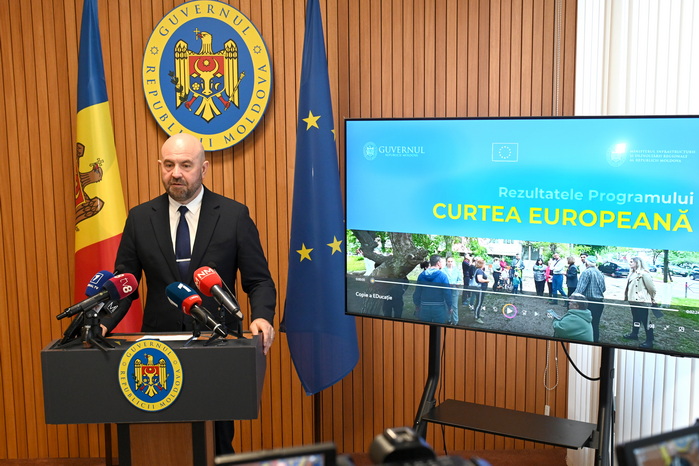
European Court Program: 472 initiatives declared eligible
After examining the 502 applications submitted under the European Court Program, 472 project initiatives were declared eligible. 250 million lei will be allocated from the state budget for the implementation of these projects. Minister of Infrastructure and Regional Development Vladimir Bolea made the statement on 11 June.
The official mentioned that at the first stage, the ministry has already developed 57 project sketches for the courtyards to be redeveloped. Additionally, another 32 courtyards have been placed on the reserve list to be financed from the remaining funds.
"When tenders for the construction of the first courtyards take place, they obviously go for the lowest price, and the entire 250 million lei will not be used. From the remaining financial resources, the next courts from the 32 will be taken. Moreover, the Ministry of Infrastructure has started making requests to the Ministry of Finance to find resources to add to this project," said Vladimir Bolea.
The minister assured that none of the 472 selected projects will be rejected and all the courtyards will be rehabilitated.
"All 472 courtyards that have been declared eligible matter to the Ministry of Infrastructure, and ultimately, the Government will provide financial resources to rebuild all these courtyards," the minister said.
Vladimir Bolea explained the reasons why some applications were not accepted initially.
The European Court program, launched by the Ministry of Infrastructure and Regional Development, is intended for the rehabilitation of courtyard blocks in the municipality of Chișinău and its suburbs.
Thus, each courtyard selected in the program can receive funding of up to 5 million lei. However, this amount may vary depending on the requests. The money will be used for modernizing access roads and stairs, installing street lighting, setting up parking lots, playgrounds, urban furniture, access ramps, and other infrastructure works.
PHOTO GALLERY // Oath of Physician and Pharmacist, Class 2025 - moments of solemnity, emotion
Moldovan carabineers to be endowed with modern equipment, new patrol vehicles for faster responses to citizens' requests
Applicants for protection, foreigners detained at state border to be fingerprinted in Moldova
Almost 1,000 graduates of Nicolae Testemitanu Medical University of Moldova take Oath of Physician and Pharmacist
Grigore Tamblac University from Taraclia to be turned into branch of Angel Kanchev University of Bulgaria
Moldova's Superior Council of Magistracy orders reevaluation of candidate for Supreme Court of Justice
Another 20,000 files of deportees sent to archive in Moldova
PHOTO //Moldovan parliament speaker says graduates of Medical University pillar of sound Moldova
Fruits' Day becomes international event: 2025 edition brings innovations, solutions for more resilient horticultural sector of Moldova
Moldova to have National Atlas
Moldovan parliament speaker asks Superior Council of Magistracy to investigate potential delays in case of Bolduresti mayor
Moldovan president meets PM of Greece
Patriot center to be directly subordinated to Moldova's president
Moldova's leadership extends condolences after plane crash in India
Moldova to join Global Platform for Access to Childhood Cancer Medicines
Moldova's cybersecurity to be strengthened with EU's support
Electoral processes in Moldova under the spotlight of Google, META
Moldovan PM says Soviet deportations brought suffering, but did not take away people's dignity
Gheorghe Budeanu appointed as new member of Supervisory and Development Board of Teleradio-Moldova Company
Moldovan president pays tribute to Stalinist repressions' victims
Moldovan PM has meeting with Greek counterpart
Moldovan infrastructure minister has meeting with Romanian Senate president
Superior Council of Prosecutors announces competition for position of Moldova's Prosecutor General
Moldovan President's message at joint news conference with Prime Minister of Greece Kyriakos Mitsotakis
Stalinist Deportations in Bessarabia // Moldovan historian says those who cared most about language, history were deported to Siberia, Kazakhstan


